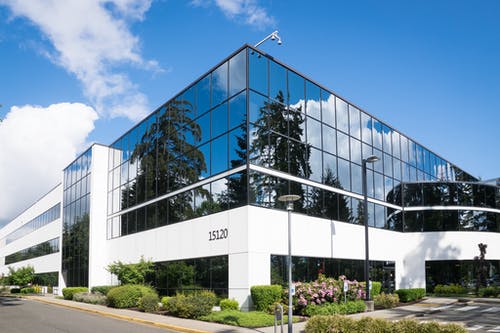Buying a commercial building is a big investment. Before a purchase is made, a Portfolio Manager may order a building inspection and report, which provides the information needed to make an informed decision on the property.
The right commercial building inspection will highlight the true condition of a property and the costs required to repair it. But what, exactly, will a commercial building inspector look for during an inspection? Keep reading to discover building inspection basics and four things an inspector will be sure to check.
THE BASICS OF COMMERCIAL BUILDING INSPECTIONS
From roof to foundation, a commercial building inspector will check a building’s health in its entirety. But before we jump into the commercial building inspection process, let’s take a look at a few basics first.
1. What is a commercial building?
A commercial building is a building or structure located on a parcel of commercial real estate. These buildings are intended to generate profit, either from capital gain or rental income. Commercial buildings are usually divided between five categories: Office Buildings, Retail/Restaurant, Multifamily Dwellings, Land and Miscellaneous.
Some examples of commercial buildings and properties include:
|
|
2. Who performs a commercial building inspection?
Asset managers have several options when it comes to hiring a commercial building inspector. The first option is to hire an engineer or architect. These individuals possess varied backgrounds in the building trades, facilities management, maintenance and similar subjects. However, it is important to note that engineers and architects may charge premium fees for their services and specialized knowledge.
A second option is to hire a commercial building inspector. Many companies specialize in both residential and commercial inspections, but be careful. The nature of a commercial inspection is unlike a residential inspection. It’s a good idea to hire a company that not only specializes in commercial inspections but also understands that commercial properties are a company asset, business expense and income generator.
3. What is the goal of a commercial building inspection?
Commercial real estate acquisitions revolve around return on investment (ROI) and residual value. Portfolio managers want to know two things: “How much will this cost?” and “How much will I make on this investment?”
This is where an inspection comes in handy. An inspection will reveal the life spans of five major systems within the building, including the following:
- Roofing
- Structural Integrity
- Electrical
- Plumbing
- Heating, Ventilation and Cooling (HVAC)
Real estate management teams want to know if the roof or HVAC system will need to be replaced in the coming years, or if electrical elements will need to be upgraded due to a change in building use. A building audit or inspection will provide insight on these questions. The resulting report will ultimately advise the portfolio company whether or not buying the property is worth the investment.
4 THINGS A COMMERCIAL BUILDING INSPECTOR WILL CHECK
Purchasing commercial property is not only expensive; it also requires a great deal of consideration and research before a purchasing decision can be made. Investors, insurance lenders, portfolio lenders and commercial mortgage-backed security (CMBS) lenders routinely order property condition assessments (PCAs) in order to learn more about a property or before entering into a purchase agreement.
Here are four things a commercial inspector will focus on during his or her inspection.
1. The Building’s Five Major Systems
Commercial buildings generally have five major systems: Electrical, Mechanical, Heating, Plumbing and Air Conditioning/Ventilation. Inspectors will check that these systems are in good working condition. If a system is not up to par, the inspector will estimate the cost of repair (or replacement) in his or her report. Fire safety systems, building alarms and sprinkler systems will also be checked during the inspection.
2. The Building’s Exterior
A building’s exterior doesn’t just include its outer walls; it also includes parking lots or structures, landscaping and roofing. The inspector will determine whether the building is structurally sound and highlight any necessary repair costs. Inspectors may rely on insight from roofing experts, construction contractors or building code inspectors to fully inspect the exterior health of a building.
3. The Building’s Interior
This portion of the inspection serves two purposes: to check that interior spaces meet local building codes, and to check for safety-related risks and hazards. The inspector will observe the building’s walls, floors, bathrooms, offices, kitchen spaces and similar areas. This portion of the inspection will illuminate any need for interior renovations (especially if anything within the building is not up to code).
4. The Building’s Documentation
Commercial building inspectors review many documents during the inspection process. They may review appraisals, building plans, citations, certificates of occupancy, construction permits, evacuation plans, environmental studies, fire safety system records, floor plans, maintenance records and surveys. These records will reveal the true cost of owning the building and help the investor determine the value of the property.
An inspector’s findings will be compiled in a final property condition report (PCR). The report will feature written evidence of observations, as well as photos for clarification. The report will also include any recommendations from the inspector on how to conduct corrective action or request follow-up testing by a specialist. In most cases there will be a cost estimate for repairs and future replacements.
Free Resource: Here’s Your Commercial Building Inspection Checklist
Making the right property investment starts with having the right tools. A commercial property inspector will be your main resource, but it never hurts to be prepared. Use this property inspection checklist to understand the true condition and value of your next investment property. By using this checklist, you’ll be better protected from falling victim to real estate investment scams due to inadequate property inspections.
